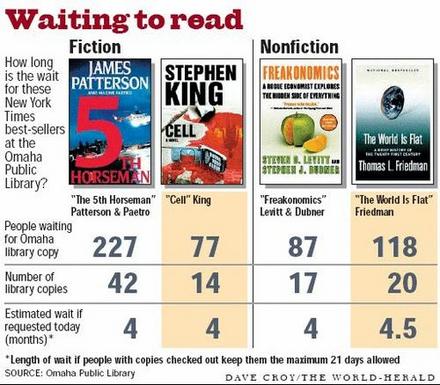
Source of the graphic is page 1 of: MICHAEL O’CONNOR. “Library may help turn borrowers into buyers.” Omaha World-Herald (Saturday, March 4, 2006): 1 & 2.
If you live in Omaha, and want to check out a copy of Thomas Friedman’s pro-trade and globalization best-seller The World is Flat, it looks as though you’re going to have to wait awhile. While you’re waiting, you may want to read his earlier, and in some ways better, The Lexus and the Olive Tree. It is better in its discussion of the importance of Schumpeterian creative destruction, and better in terms of the coherence and flow of the argument.
See:
Friedman, Thomas L. The Lexus and the Olive Tree. New York: Anchor Books, 2000. [ISBN # 0-385-49934-5]
Friedman, Thomas L. The World Is Flat: A Brief History of the Twenty-First Century. New York: Farrar, Straus and Giroux, 2005.
Category: Economics
“Unlike Pilots, Doctors Don’t Go Down with Their Planes”
(p. C1) With all the tools available to modern medicine — the blood tests and M.R.I.’s and endoscopes — you might think that misdiagnosis has become a rare thing. But you would be wrong. Studies of autopsies have shown that doctors seriously misdiagnose fatal illnesses about 20 percent of the time. So millions of patients are being treated for the wrong disease.
As shocking as that is, the more astonishing fact may be that the rate has not really changed since the 1930’s. “No improvement!” was how an article in the normally exclamation-free Journal of the American Medical Association summarized the situation.
. . .
But we still could be doing a lot better. Under the current medical system, doctors, nurses, lab technicians and hospital executives are not actually paid to come up with the right diagnosis. They are paid to perform tests and to do surgery and to dispense drugs.
There is no bonus for curing someone and no penalty for failing, except when the mistakes rise to the level of malpractice. So even though doctors can have the best intentions, they have little economic incentive to spend time double-checking their instincts, and hospitals have little incentive to give them the tools to do so.
. . .
(p. C4) Joseph Britto, a former intensive-care doctor, likes to compare medicine’s attitude toward mistakes with the airline industry’s. At the insistence of pilots, who have the ultimate incentive not to mess up, airlines have studied their errors and nearly eliminated crashes.
“Unlike pilots,” Dr. Britto said, “doctors don’t go down with their planes.”
For the full story, see:
DAVID LEONHARDT. “Why Doctors So Often Get It Wrong.” The New York Times (Weds., February 22, 2006): C1 & C4.
Vouchers Enable Choice, Competition, and Learning
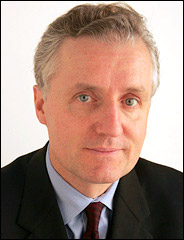
John Tierney. Source of image: online version of NYT article cited below.
The New York Times Op-Ed education columnist offers a provocative evaluation of how Milton Friedman’s educational voucher proposal is working in Milwuakee:
The Journal Sentinel, which endorsed John Kerry in 2004, has parted company with the Democratic Party on the voucher issue. It backed Republican efforts this year to expand the program, which has led to the creation of dozens of new private schools in Milwaukee.
“We’ve seen what school choice can do,” said Gregory Stanford, an editorial writer and a columnist at the paper. “It’s impressive to go around to the voucher schools and see kids learning. Their parents are much more satisfied with these schools. And the fears that the public schools would be hurt have turned out to be wrong.”
In fact, the students in public schools have benefited from the competition. Two studies by Harvard researchers, one by Caroline Hoxby and another by Rajashri Chakrabarti, have shown that as the voucher program expanded in Milwaukee, there was a marked improvement in test scores at the public schools most threatened by the program (the ones with large numbers of low-income students eligible for the vouchers).
The competition spurred the public system to shift power from the central administration to individual schools, allowing councils of parents and teachers to decide who should teach there, instead of forcing the schools to accept incompetent teachers just because they had seniority.
“Poor teachers used to shuffle from one school on to another in what we called the dance of the lemons,” says Ken Johnson, the head of the school board. “But we couldn’t let that continue once our students had the option to go somewhere else. We had to react to students’ needs. We had to start seeing them as customers, not just seat-fillers.”
Some of the new voucher schools have flopped — but the advantage of a voucher program is that a bad private school can be shut down a lot faster than a bad public school. And while critics complain that there still isn’t definitive evidence that voucher students are doing better over all in their new schools, the results so far in Milwaukee and other cities are more than enough to declare vouchers a success.
“All the good research, including the voucher opponents’ work, shows that kids who accept vouchers are doing at least as well as their public school peers,” says Joseph Viteritti of Hunter College. “That’s remarkable, considering how much less money is being spent on the voucher students.”
In Milwaukee, where the public system spends more than $10,000 per student, private schools get less than $6,400 for each voucher student. But when you see what can be done for that money, you realize what’s wrong with Democrats’ favorite solution for education: more money for the public-school monopoly.
. . .
The school principal, Denise Pitchford, worked in the public schools, but she took a pay cut in exchange for less red tape. “I wanted the flexibility to give immediate personal attention to every student,” she said. “To me, it represented less money but a better opportunity.” Just like the whole voucher program.
For the full story, see:
JOHN TIERNEY. “City Schools That Work.” The New York Times (Tues., March 7, 2006): A25.
Note: This article was reprinted under the title “Vouchers Offer Many Positives.” in: Omaha World-Herald (Weds., March 8, 2006): 7B.
Farmer Ed Wiederstein Opposes Farm Subsidies
Opposing government subsidies to one’s own group is a good way to make enemies. Few have the guts or principles to do so. So it is worth pausing to salute farmer Ed Wiederstein:
. . . Ed Wiederstein of Audubon, Iowa, said direct payments reduce motivation for farmers to be self-sufficient and often give money to people who don’t need it.
“Do I deserve money from the government to, supposedly, support me any more than the Ace Hardware man in downtown Audubon, or the feed store, the local newspaper, the local flower shop or the funeral home?” Wiederstein said. “Is what they do really any less important than what I do?
“There are a lot of farmers with a million-dollar net worth receiving thousands of dollars of support. Somehow, that picture just doesn’t look right.”
Rep. Jerry Moran, R-Kan., called Wiederstein an “outside thinker.”
Peterson told Wiederstein, “If you were up in western Minnesota, you might run into some trouble right now.”
A number of people said there should be less reliance on price guarantees and more on entrepreneurship and the creativity of American farm families.
For the full story, see:
“Farm subsidies, imports debated at Ag Committee meeting.” Omaha World-Herald (Monday, March 6, 2006): 8B.
Lazear, New Chair of Council of Economic Advisors, Emphasizes Labor Market Flexibility
Ed Lazear was a labor economist at the University of Chicago during the time that I was a graduate student there, circa 1975-81. Sometimes in collaboration with the late Sherwin Rosen, he created models of the labor market that suggest ways of understanding otherwise puzzling labor market phenomena, for example in suggesting that CEOs might be highly paid to provide an incentive for all those who participate in the ‘rank-order tournament’ that results in the choice of CEO (see the Lazear-Rosen paper cited below).
Here is a brief excerpt from remarks by Ed Lazear following his being sworn in as Chair of the President’s Council of Economic Advisors on 3/6/06:
Healthy productivity growth over the past few years has been followed by impressive job creation and reductions in unemployment rates to levels that are low by historical standards. And we continue to improve. Much of the strength of the U.S. economy results from flexibility in labor and capital markets, and from keeping tax rates low.
For the full remarks, see: http://www.whitehouse.gov/news/releases/2006/03/20060306.html (Thanks to Gary Blank for providing me this link.)
One of Lazear’s most interesting papers:
Lazear, Edward, and Sherwin Rosen. “Rank-Order Tournaments as Optimum Labor Contracts.” Journal of Political Economy 89, no. 5 (1981): 841-864.
The Market Rewards the Unprejudiced
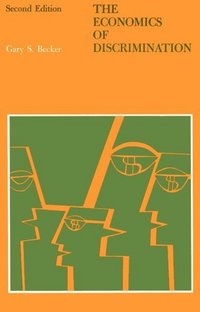 Source of book cover image: Amazon.com.
Source of book cover image: Amazon.com.
In his doctoral disseratation on the economics of discrimination, Gary Becker argued that those who discriminate in the labor market pay a price for their prejudice in the form of having to pay higher wages. Those who do not discriminate have open to them an additional pool of workers, whose talents will contribute to the firm’s bottom line. GE’s Jack Welch recounts a story that supports Becker’s claims:
(p. 212) Another idea I’ll leave behind is one that developed when I was visiting Japan in the fall of 2000. I had been going there for years and found it difficult to get the best male Japanese graduates (p. 213) to join us. We were having increasing success, but still had a long way to go. Finally, it dawned on me. One of our best opportunities to differentiate GE from Japanese companies was to focus on women. Women were not the preferred hires for Japanese companies, and few had progressed far in their organizations. Again, I got revved up. Fortunately, we had Anne Abaya, an ideal Japanese-speaking U.S. woman in a senior position at GE Capital. She agreed to go to Tokyo to become head of human resources for GE Japan. I gave her a million dollars for an advertising campaign to position GE as "the employer of choice for women. What I didn’t know was how much talent we already had in place. In May 2001, when Jeff and I were on a Japanese business trip, we had a private dinner with 14 of our high-potential women. They ranged from CFO of GE Plastics Japan, general manager of sales and marketing of GE Medical Systems Japan, marketing director of GE Consumer Finance Japan, to the heads of human resources for GE-Toshiba Silicones and GE Medical Systems. Jeff and I had never been with a more impressive young crowd. It confirmed for me how big the opportunity could be.
Source:
Welch, Jack. Jack: Straight from the Gut. New York: Warner Business Books, 2001.
For the revised version of Becker’s dissertation, see:
Becker, Gary S. The Economics of Discrimination. 2nd Rev. ed., Economic Research Studies. Chicago: University of Chicago Press, 1971.
Harry Browne Sought Freedom in an Unfree World
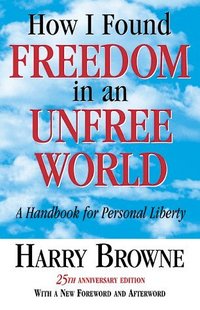
Source of book image: Amazon.com.
Harry Browne died Wednesday, on March 1, 2006, of Lou Gehrig’s disease.
Every semester I mention Browne to students in most of my classes. I tell them of his bestseller, How I Found Freedom in an Unfree World.
I have not read the book for many years. My memory is that Browne tells of how he was unhappy in a high-paying investment career because he did not like having to report to the job on set days, at set times, and to take orders he sometimes did not agree with, from bosses he did not always respect.
He did not feel free, and he he felt that being unfree was making him unhappy. So he quit, his job, divorced his wife, and headed west to write best-selling self-help books.
I tell my students that we don’t have to go as far as Browne did in order to sympathize with his wishing he was not constrained by the firm that had employed him. So I ask my students: given the appeal of Browne’s sentiments, why do we have firms? Why don’t we all just become independent contractors?
The answer, I tell them, is to be found in Ronald Coase’s article “The Theory of the Firm,” in which Coase suggests that firms reduce the transaction costs of team production activities.
I also mention, though, that developments in information technology and the internet, are reducing the transactions costs of creating production teams on a project-by-project basis, and hence are increasing the feasibility of more and more of us becoming independent contractors, or at least working for small firms.
In this regard, I refer them to an article co-authored by Brynjolfsson that argues that IT has differentailly benefitted the small firm, and I refer them to Daniel Pink’s Free Agent Nation. I also mention web sites like guru.com that make it possible for those who want to work as free-agents to find firms that want to hire them on a project-by-project basis. I tell them about the movie industry, that already pretty much assembles teams on a project-by-project basis.
The world may never be the way Harry Browne wanted it to be. But it may be possible to come closer to Browne’s vision, than Browne’s detractors imagined.
Besides his book Harry Browne served the cause of freedom in other ways as well, running for President in 1996 and 2000 on the Libertarian Party ticket.
I do not completely share Browne’s views: sometimes he seems to treat personal commitments too cavalierly. But he wrote well, he stimulated thought, and he sought to make the world a better place. Harry Browne, rest in peace.
Owlish Evidence: More on Why Crichton is Right
Environmentalists have hypothesized that there is a link between harvesting old-growth forests and declines in owl populations. But there is reason to believe that the hypothesis may be false, and apparently environmentalists and the federal government do not have much interest in testing it:
. . . , we know little about the relationship between harvesting and owl populations. One such study — privately funded — infers an inverse relationship between harvesting and owls. In other words, in areas where some harvesting has occurred, owl numbers are increasing a bit, or at least holding their own, while numbers are declining in areas where no harvesting has occurred.
This news will come as no surprise to Oregon, Washington and California timberland owners who are legally required to provide habitat for owls. Their actively managed lands are home to the highest reproductive rates ever recorded for spotted owls. Why is this?
One possible answer is that the anecdotal evidence on which the listing decision was based is incomplete. No one denies the presence of owls in old-growth forests, but what about the owls that are prospering in managed forests and in forests where little old growth remains? Could it be that spotted owls are more resourceful than we think?
We don’t know — and the reason we don’t know is that 16 years ago federal scientists chose to politicize their hypothesis rather than test it rigorously, to flatly reject critiques from biometricians who questioned the statistical validity of the evidence on which the listing decision was based, and to declare with by-god certainty that once the old-growth harvest stopped owl populations would begin to recover.
For the full story, see:
JIM PETERSEN. “RULE OF LAW; Owl Be Damned.” The Wall Street Journal (Sat., February 18, 2006): A9.
EU Legislation to Protect the Incompetent
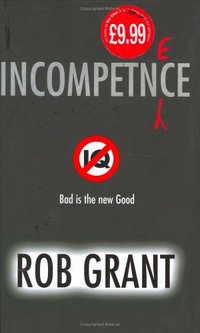
The source for the book cover image is: Amazon.com.
The brief book description on Amazon. com:
Bad is the new good. In the not too distant future the European Union enacts its most far reaching human rights legislation ever. The incompetent have been persecuted for too long. After all it’s not their fault they can’t do it right, is it? So it is made illegal to sack or otherwise discriminate against anyone for being incompetent. And now a murder has been committed and our possibly incompetent detective must find out who the murderer is. As long as he can find directions to get him through the mean streets.
Rob Grant. Incompetence. Orion Pub Co., 2003. ISBN: 0575074191
Who Decides Treatment When Medicine is Socialized?
 Ann Marie Rogers at High Court in London on Wed., Feb. 15, 2006. Image source: online version of NYT article quoted and cited below.
Ann Marie Rogers at High Court in London on Wed., Feb. 15, 2006. Image source: online version of NYT article quoted and cited below.
(p. A6) LONDON, Feb. 15 — When her local health service refused to treat her breast cancer with the drug Herceptin, 54-year-old Ann Marie Rogers sued. But on Wednesday, a High Court judge ruled against her.
In his decision the judge, David Bean, said that although he sympathized with Ms. Rogers’s predicament, the health service in Swindon, where she lives, had been justified in withholding the drug.
“The question for me is whether Swindon’s policy is irrational and thus unlawful,” Justice Bean wrote. “I cannot say it is.”
The ruling has potentially serious implications for patients across the taxpayer-financed National Health Service.
Despite health officials’ contention that decisions about treatment are based solely on clinical effectiveness, critics contend that with drugs growing ever more expensive, cost has become an increasingly important factor. They also say patients are at the mercy of the so-called postcode lottery, in which treatments are available in some postal zones but not others.
For the full story, see:
SARAH LYALL. “British Clinic Is Allowed to Deny Medicine; Decision on Cost Has Broad Impact.” The New York Times (Thurs., February 16, 2006): A6.
Missing the Boat: More on Why Africa Is Poor
 Source of photo: online version of the NYT article cited below.
Source of photo: online version of the NYT article cited below.
KHARTOUM, Sudan, Jan. 30 — Sudan’s government pulled out all the stops for the heads of state who swept into town for the African Union summit conference last week. Streets were scrubbed and welcome signs erected. Elegant new villas, outfitted with fancy linen and china, were put up along the Nile.
And then there was the fancy presidential yacht that was supposed to ferry the dignitaries up and down the river for evening soirees. Much like Sudan’s hopes of assuming the chairmanship of the African Union at the conference, though, the boat never materialized.
Even after the presidents had come and gone, the yacht was nowhere to be found. It was not on the White Nile, which flows northward from Lake Victoria. Nor was it on the Blue Nile, which swoops into Khartoum from Ethiopia.
But Ibrahim Khalfalla never lost sight of the hulking craft, which has two decks and is 118 feet long and 32 feet wide. He was the man charged with getting the boat from Slovenia, where it was built for an estimated $4.5 million, to Sudan, where President Omar Hassan al-Bashir planned to inaugurate it. And although he missed his deadline, Mr. Khalfalla said he did the best he could under the circumstances.
“This is difficult, so difficult,” he said, as the huge tractor-trailer that had been carrying the boat from Port Sudan to Khartoum by road inched close to its destination the other day. “You don’t know how difficult.”
It was actually rather easy to see how challenging a job this was. Even with the boat a mere 200 feet from the water’s edge, serious obstacles remained, like the building that the precious cargo struck while Mr. Khalfalla motioned wildly at the man behind the wheel of the truck.
As the yacht scraped against a brick wall, onlookers let out a groan. Soon workers were atop the boat, prying away bricks.
. . .
But even before the craft hit the water, it was taking on criticism from those who viewed it as an extravagant symbol of just how far removed the government is from the people.
Disparaged in newspapers as “Bashir’s boat” and a “million-dollar toy,” the craft, with its sophisticated satellite technology, elaborate presidential suite and dining facilities for 76 guests, left critics unimpressed.
The Juba Post, saying the government had “missed the boat,” called on officials to donate it to the Red Cross as a floating hospital ship. “Children scrounge for food in Khartoum North,” the paper said, not far from “the president’s expensive shipwreck.”
Another newspaper, The Khartoum Monitor, lamented that the government was using barges to take people displaced from the long war in the south back to their homes while the government imported a luxurious vessel for partying.
For the full story, see:
MARC LACEY. “Khartoum Journal: Sudan Leader Waits, and Waits, for His Ship to Come In.” The New York Times (Tues., January 31, 2006): A4.
(Note: ellipsis added.)
 Source of photo: online version of the NYT article cited above.
Source of photo: online version of the NYT article cited above.

